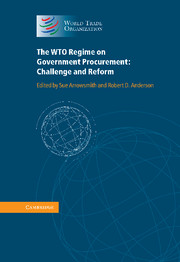Book contents
- Frontmatter
- Contents
- List of contributors
- Foreword by Pascal Lamy
- Perspective of the Chairman of the WTO Committee on Government Procurement, Nicholas Niggli (Switzerland)
- Preface
- Disclaimer
- PART I The WTO regime on government procurement
- PART II Expanding the scope of the Agreement on Government Procurement: accession and coverage
- PART III Revision of the procedural rules and other transparency provisions of the Agreement on Government Procurement
- PART IV Developing countries in the WTO procurement regime
- PART V Economic and social development (horizontal policies) in government procurement
- PART VI Enforcement and remedies
- PART VII Multilateralism and regionalism
- PART VIII Challenges and new directions
- Index
Perspective of the Chairman of the WTO Committee on Government Procurement, Nicholas Niggli (Switzerland)
Published online by Cambridge University Press: 07 September 2011
- Frontmatter
- Contents
- List of contributors
- Foreword by Pascal Lamy
- Perspective of the Chairman of the WTO Committee on Government Procurement, Nicholas Niggli (Switzerland)
- Preface
- Disclaimer
- PART I The WTO regime on government procurement
- PART II Expanding the scope of the Agreement on Government Procurement: accession and coverage
- PART III Revision of the procedural rules and other transparency provisions of the Agreement on Government Procurement
- PART IV Developing countries in the WTO procurement regime
- PART V Economic and social development (horizontal policies) in government procurement
- PART VI Enforcement and remedies
- PART VII Multilateralism and regionalism
- PART VIII Challenges and new directions
- Index
Summary
I believe that, in the coming decade, the WTO Agreement on Government Procurement (GPA) will undergo a transition from being an important but relatively obscure plurilateral treaty to becoming a central pillar of the multilateral trading system. This reflects a confluence of factors, including: (i) the growing membership of the Agreement, and the prospect of accession to it by a broad range of developing, transition and other economies in the coming years; (ii) the prospect of a gradual broadening, over time, of the extent of Parties' procurements that are actually covered by the Agreement, in addition to an updating of the Agreement itself to enhance its flexibility, user-friendliness and relevance, for example, to developing countries; and (iii) the role that public infrastructure investment will undoubtedly continue to play as an underpinning of growth in the aftermath of the economic crisis, and the critical importance of such spending being undertaken on the basis of principles of fair and open competition to maximize value for taxpayers.
While the third factor noted above is largely exogenous to the work of the WTO Committee on Government Procurement, the first and second fall directly within its remit, and have been the focus of intensified effort by Parties to the Agreement, in addition to myself as Chairman, and with the support of the Secretariat, in the past few years.
- Type
- Chapter
- Information
- The WTO Regime on Government ProcurementChallenge and Reform, pp. xxix - xxxiiPublisher: Cambridge University PressPrint publication year: 2011
- 3
- Cited by



